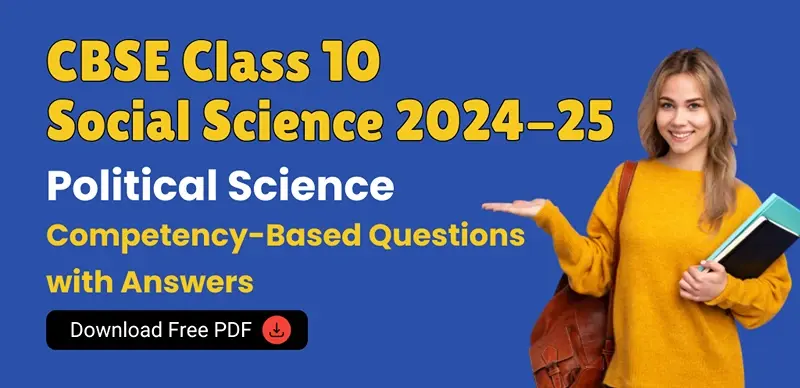CBSE Class 10 Social-Science (Political Science) 2024-25: Competency-Based Questions with Answers; Download Free PDF

SHARING IS CARING
If our Website helped you a little, then kindly spread our voice using Social Networks. Spread our word to your readers, friends, teachers, students & all those close ones who deserve to know what you know now.
As the CBSE Class 10 board exams approach, it's crucial for students to understand the updated exam pattern for 2024-25. The CBSE now includes 50% more competency-based questions, which will be a mix of multiple-choice and written questions. These questions aim to assess students' ability to apply their knowledge in real-life situations.
This article focuses on Political Science from CBSE Class 10 Social Sciences syllabus. It covers key competency-based questions that are expected in the exam and provides detailed answers to help students prepare effectively.
Download the free PDF to get a comprehensive set of competency-based questions and answers for Social-Science (Political Science), and ensure you’re ready for your upcoming exams. By practicing these questions, students can improve their problem-solving skills, understand important environmental issues, and succeed in their CBSE Class 10 SST exams.
CBSE Class 10 Social Science (Political Science) Important Competency-Based Questions
Q: 1 Proportionality is an important practice in power sharing which includes proportional allocation of jobs, representation and participation by ethnic group leaders etc. Which of the following is an example of proportionality?
1. Many political organisations demanded an independent Tamil state in Sri Lanka.
2. Roles and responsibilities are allotted to both the Central and the State government in India.
3. Around 24% of total seats in Lok Sabha are reserved for members belonging to SC-ST categories.
4. The minority French-speaking community (around 45%) is more rich and powerful than the majority Dutch-speaking community in Belgium.
Answer. 3
Q: 2 There are two statements given below, marked as Assertion (A) and Reason (R). Read the statements and choose the correct option.
A: Power-sharing can only emerge in a democratic setup.
R: In an ideal democracy, political power is distributed among as many people as possible.
1. A is true but R is false.
2. A is false but R is true.
3. Both A and R are true and R explains A.
4. Both A and R are true but R does not explain A.
Answer. 2
Read the passage given below and answer the questions based on it.
Between 1992-95, a conflict broke out between three ethnic groups in the Bosnian territory. These three ethnic groups are the Bosnian Serbs, the Bosnians Croats and the Bosnian Muslims.
These ethnic groups had religious differences as the Serbs were Orthodox, the Croats were Catholics and the Muslims followed Islam. As a compromise, Dayton agreement was designed. It proposed power-sharing as a solution to reduce the conflict. Dayton consisted of both territorial and political power-sharing.
A system was chosen where the national ethnicities were separated by territory. There is significant autonomy granted to the separate entities, since they each have their own presidents, parliaments and other governing bodies, which are responsible for policy making on the entity level.
So instead of having one president, the entire population of Bosnia is represented by a
three-presidency which consist of a Bosniak, a Croat and a Serb. The 42 seats of the House of Representatives are chosen by proportional representation which results in a corresponding reflection of the population. The seats in the other house, House of Peoples, are equally divided amongst the ethnicities. There is clear political and territorial power sharing found within the case of Bosnia-Herzegovina.
Although the Dayton Agreement did stop the violence and stabilised the conflict, it seems to have made the ethnic differences more rigid.
Source(edited): The Experience of power sharing through Bosnia Herzegovina, Wageningen University, 2014
Q: 3 (a) What was the reason for the conflict in the Bosnian territory?
Answer. (a) Award 1 mark for the following:
ethnic and religious differences between the three communities
Q: 4 (b) Mention the two forms of power-sharing that were proposed as a solution to the conflict.
Answer. (b) Award 1 mark to the following:
territorial and political power sharing
| Download PDF | |
| CBSE Class 10 Social-Science (Economics) Important Competency-Based Questions 2024-25 | Click Here |
| CBSE Class 10 Social-Science (Geography) Important Competency-Based Questions 2024-25 | Click Here |
| CBSE Class 10 Social-Science (History) Important Competency-Based Questions 2024-25 | Click Here |
| CBSE Class 10 Social-Science (Political Science) Important Competency-Based Questions 2024-25 | Click Here |
Q: 5 (c) Mention one example each for the two forms of power sharing that was adopted in the Bosnian territory.
Answer. (c) Award 0.5 mark each for the following points or any other relevant example:
(1) territorial: the national ethnicities were separated by territory
(2) political: proportional representation in the House of Representatives
Q: 6 (d) Mention one positive effect that power sharing had on the conflict in the Bosnian territory.
Answer. (d) Award 1 mark to the following:
power sharing reduced the violence in the territory
Q: 7 Read the following lines from an article written by a group of authors.
"The rise of majoritarianism in recent years may weaken power-sharing in Indian democracy. There is a need for constitutional provisions to protect minority rights." Which type of reasoning for power-sharing is visible here?
Answer. Moral reason
Q: 8 (a) State whether the following statement is true or false.
'Power sharing is effective only for small countries like Belgium.'
(b) Given an example to support your answer.
Answer. (a) Award 0.5 marks for the following
false
(b) Award 0.5 marks for the following or any other relevant example:
The given statement is false because power sharing is also effective in a large and diverse country like India.
Q: 9 One of the remedies that are suggested for societies struggling with civil conflict are power-sharing arrangements that accommodate the various parties involved in the civil conflict. Power-sharing guarantees each of the critical players, a significant payoff from cooperation and peaceful behavior. This peaceful behaviour can be maintained in the power-sharing arrangements in two ways:
(1) by providing minimum benefit to each party from cooperation in collective decisions, and
(2) through provisions that protect group autonomy in sensitive policy areas.
1) In Lebanon, The Prime Minister must be a Sunni Muslim and the Deputy Prime Minister must be an Orthodox Christian. Which of the two ways of maintaining peaceful behaviour given above is this an example of?
2) Give one example each for the two ways of maintaining peaceful behaviour in the context of power sharing arrangement in Belgium. Source: Power sharing, Agency and Civil Conflicts, Scott Gates, 2007.
Answer. 1) Award 1 mark for the following:
This is an example of providing minimum benefit to each party to cooperate in collective decisions
2) Award 1 mark each for the following or any other relevant point:
a) The French-speaking people accepted equal representation in Brussels because the Dutch-speaking community accepted equal representation in the Central Government- providing minimum benefit to each party for cooperating in collective decisions
b) Community government in Belgium- protects group autonomy in sensitive policy areas
Q: 10 (1) Bengaluru's Jalaposhan trust, a citizens collective, collaborates with the Municipal Corporation (BBMP) of Bengaluru to conserve and revive a lake in the city.
(2) In Maharashtra, every level of government was given a stake in taking action against the spread of coronavirus.
(a) State the type of power-sharing arrangement that each of the two examples represent?
(b) In the above examples, who is sharing power with whom?
(c) In which kind of government are such power-sharing arrangements possible?
Answer. (a) Award 1 mark each to the following:
(1) Power-sharing between pressure groups and people in power
(2) Power-sharing between different levels of government
(b) Award 1 mark each to the following:
(1) the local body of governance (BBMP) is sharing power with a pressure group (citizens collective)
(2) The state government of Maharashtra with the municipal and the village panchayats.
(c) democratic government
-
👉 Read Also- CBSE Class 10 Half-Yearly/Mid Term 2024-25 : Most Important Questions with Answers; PDF Download (All Subjects)
👉 CBSE Class 10 Study Materials
| CBSE Class 10 Syllabus 2024-25 | NCERT Solutions For Class 10 |
| CBSE Class 10 Previous Year Question Papers | CBSE Class 10 Books |
| CBSE Class 10 Full Study Material | CBSE Class 10 Sample Paper |







 Profile
Profile Signout
Signout












 Quiz
Quiz
 Get latest Exam Updates
Get latest Exam Updates 










